The latest Purchasing Managers’ Index (PMI) survey data from Qatar Financial Centre (QFC) indicated a positive start for the second half of 2023. Growth rates for output, new orders, employment and purchasing increased, and the 12-month outlook remained firmly positive.
The unfinished business continued to decline at a lower rate than in the first half of this year, while inflationary pressures on prices receded.
The Qatar PMI indices are compiled from survey responses from a panel of around 450 private sector companies. The panel covers the manufacturing, construction, wholesale, retail, and services sectors, and reflects the structure of the non-energy economy according to official national accounts data.
The headline Qatar Financial Centre PMI is a composite single-figure indicator of non-energy private sector performance. It is derived from indicators for new orders, output, employment, suppliers’ delivery times and stocks of purchases.
The PMI slightly increased from 53.8 in June to 54.0 in July, indicating another strong improvement in business conditions. The latest reading was higher than the index’s average for the first half of 2023 of 52.5 points and well above the index’s long-term trend of 52.3 points.
New orders witnessed a significant increase in July 2023, but the growth rate of new orders decreased again since May 2023, and yet it remained one of the fastest rates recorded during the past year. The growth rate of new business in the financial services sector remained remarkably high.
The total commercial activity of non-energy private sector companies in Qatar recorded new growth in July 2023. The production index has continued to grow monthly for more than three years, with the exception of the decline recorded in January 2023 after the conclusion of the FIFA World Cup Qatar 2022. The growth rate of commercial activity has increased since June 2023 and it was the second highest recorded in 2023 so far.
The expectations of private sector companies not related to energy in Qatar for the next 12 months remained positive, and the increase in expected business volume is related to the implementation of new sales strategies, the recruitment of new employees, the strengthening of activity in the tourism sector and the launch of new products.
Most companies in various sectors provided positive forecasts for business activity, especially the service sector, followed by the commodity production sector.
Data for July 2023 indicated another increase in employment in non-energy private sector economy in Qatar, at the fastest rate since July 2022, with the aim of reducing workloads and unfinished business, which decreased for the 12th month in a row.
Supply chains and supplier delivery times continued to improve at a record 15th consecutive month. Inventories of inputs increased slightly, indicating optimal management of inventory levels by Qatari firms during July.
Inflationary pressures related to prices eased in July, as the aggregate input price index since June 2023 fell at a level indicating a marginal rate of inflation. Meanwhile, output prices fell for the third month in a row, at a slight pace.
As for the financial services sector in Qatar, it continued to grow significantly at the beginning of the second half of the year 2023.
The growth rate of new business remained sharp, which led to a strong rise in overall activity, and business activity expectations for the next year improved since June 2023, and the number of employees of financial services companies increased by the highest rate in over a year.
New business rose at the second fastest rate in almost a year and well above the index’s long-term trend.
Overall business activity in the financial services sector rose for the 25th consecutive month, and at a relatively strong rate.
The outlook for business activity has improved since June 2023, and financial services firms have increased staff numbers at the highest rate in 14 months.
Data for July 2023 indicated an increase in fees for financial services in Qatar after declining in June 2023. Overall pressures on costs increased slightly.
Chief Executive Officer of QFC Authority Yousuf Mohamed Al Jaida said that the PMI data for the State of Qatar indicated the continuation of the growth of commercial activity of non-energy-related private sector companies with the beginning of the second half of the year 2023.
The last PMI reading scored 54.0 points, which is much higher than the long-term average of the study, as overall business activity and demand rose sharply in July 2023.Qatari companies also increased the numbers of their employees as the slow decline in unfinished business indicated the return of pressures on the productive capabilities of Qatari companies.
The financial services sector continued to support the business activity of the non-energy private sector economy, as key indicators of production and new business rose again in July, Al Jaida noted, adding that the employment index also reached its highest level in more than a year.
There was slight pressure on input costs in July, which helped Qatari companies reduce the prices of their goods and services for the third month in a row, he continued, pointing out that the decrease in the costs of production inputs again in Aug. 2023 would record the longest series of declines in almost four years.
PMI studies now cover more than 40 major countries and regions including the Eurozone.
PMIs have become the most followed studies in the world and are favored by central banks, financial markets and business decision makers for their ability to Provide up-to-date, accurate and distinct monthly indicators of economic patterns. The QFC’s PMI is compiled by S&P Global using responses to questionnaires sent to purchasing managers in a panel of nearly 400 Qatari non-energy private sector companies. The authority is divided according to the detailed size of the sectors and workforce of the companies, and based on the contributions to the gross domestic product.
The study covers the following sectors: manufacturing, construction, retail and wholesale, and services.
The PMI is the average of the following five indices: New Orders (30 percent), Output (25 percent), Employment (20 percent), Suppliers’ Delivery Times (15 percent) and Inventory of Purchases (10 percent) ). When calculating the PMI, the supplier delivery times index is reversed so that it moves in a similar direction to the other indices.
Qatar tribune


